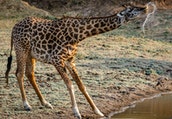- 1. Africa Leopard Appearance: Leopards have a slender and muscular body with a distinctive coat pattern. They are covered in golden-yellow fur, which is decorated with dark, rosette-shaped spots. The pattern provides excellent camouflage in their natural habitats.
- 2. Africa Leopard Reproduction: Leopards breed throughout the year, and females give birth to a litter of usually 2 to 3 cubs after a gestation period of about 90 to 105 days. Cubs stay with their mother for around 18 to 24 months, learning vital hunting and survival skills.
- 3. Africa Leopard Size: Leopards are medium-sized big cats. Adult males weigh between 130 to 220 pounds (60 to 100 kilograms), while females are generally smaller, weighing between 65 to 130 pounds (30 to 60 kilograms).
- 4. Africa Leopard Habitat: Leopards are highly adaptable and can be found in various habitats, including savannas, grasslands, forests, and mountainous regions. They are known to occur in both protected national parks and reserves as well as in some human-altered landscapes.
- 5. Africa Leopard Diet: Leopards are carnivorous and are skilled hunters. They have a diverse diet that includes small to large mammals, such as antelope, deer, monkeys, and even smaller predators like birds and reptiles. Leopards are known for their ability to carry prey up into trees to protect it from scavengers.
- 6. Africa Leopard Conservation Status: The conservation status of leopards varies depending on their geographic location. They are listed as "Vulnerable" by the International Union for Conservation of Nature (IUCN). Threats to leopard populations include habitat loss, poaching, and conflict with humans.
- 7. Africa Leopard Behavior: Leopards are solitary animals and are mostly active during the night, making them primarily nocturnal. They are excellent climbers and swimmers, which aids them in hunting and evading threats.
- 8. Africa Leopard Predators: While leopards are powerful predators, they face threats from larger predators, such as lions and hyenas, who may steal their kills or attack their cubs.
Africa Leopard
The leopard (Panthera pardus) is one of Africa's most iconic and elusive big cats.
Africa Safari Tour Book online The Leopard safari
Here is some information about the leopard:
Africa Leopard Safari
An Africa leopard safari offers a thrilling and unforgettable opportunity to observe one of the most elusive and majestic big cats in their natural habitat. Spotting a leopard in the wild is a remarkable and sought-after experience. Their elusive nature and incredible beauty make them a true highlight of any African safari.
By planning ahead and choosing reputable safari operators or guides, you can have an unforgettable leopard-focused safari and create lasting memories of witnessing these magnificent big cats in their natural African environment.
Here are some key points to consider when planning a leopard-focused safari:
Africa Leopards Safari Destinations
Safari Destinations: Leopards can be found in various regions of Africa, but some areas are renowned for their high leopard densities and excellent leopard sightings. Some popular safari destinations for leopard encounters include:
- South Africa: Sabi Sand Game Reserve, Kruger National Park.
- Botswana: Okavango Delta, Moremi Game Reserve.
- Zambia: South Luangwa National Park, Lower Zambezi National Park.
- Tanzania: Serengeti National Park, Ngorongoro Crater.
- Kenya: Maasai Mara National Reserve, Samburu National Reserve.
Africa Leopard Safari Game Drives:
Participate in game drives, which are guided tours in open vehicles, to explore the national parks and reserves where leopards are commonly found. Game drives offer excellent opportunities for wildlife viewing, including leopards and other African wildlife.
Africa Leopard Guided Walking Safaris:
Consider participating in guided walking safaris to get up close to leopard territories and experience the African bush on foot. Walking safaris provide a more intimate and immersive experience with the wildlife and their natural environment.
Africa Leopard Nocturnal Game Drives:
Leopards are primarily nocturnal animals, and some safari operators offer special nocturnal game drives to observe them during their most active periods at night. These drives use spotlights to spot and follow leopards as they hunt and move through the darkness.
Africa Leopard Expert Guides:
Expert Guides: Engage experienced safari guides who are knowledgeable about leopard behavior and habitats. They can help track and locate leopards, increasing your chances of successful sightings.
Africa Leopard Accommodations
Choose accommodations located near the water bodies where Leopard are commonly found. Many lodges and camps offer opportunities for boat safaris or have waterholes frequented by Leopard.
Africa Leopard Photography Opportunities
Photography Opportunities: Bring a good camera with a zoom lens to capture leopard sightings and other wildlife in their natural habitats. A pair of binoculars will also be useful for better wildlife viewing.
Africa Leopard Wildlife Diversity:
Wildlife Diversity: While on your leopard safari, you'll likely encounter a diverse range of African wildlife, including other predators, antelope species, elephants, giraffes, and various birdlife.
Africa Leopard Conservation and Responsible Tourism:
Conservation and Responsible Tourism: Practice responsible wildlife viewing by following park regulations and respecting the natural behavior of leopards and other animals. Support conservation efforts that aim to protect the habitats and populations of these magnificent big cats.








 |
|  |
|  |
|  |
| 